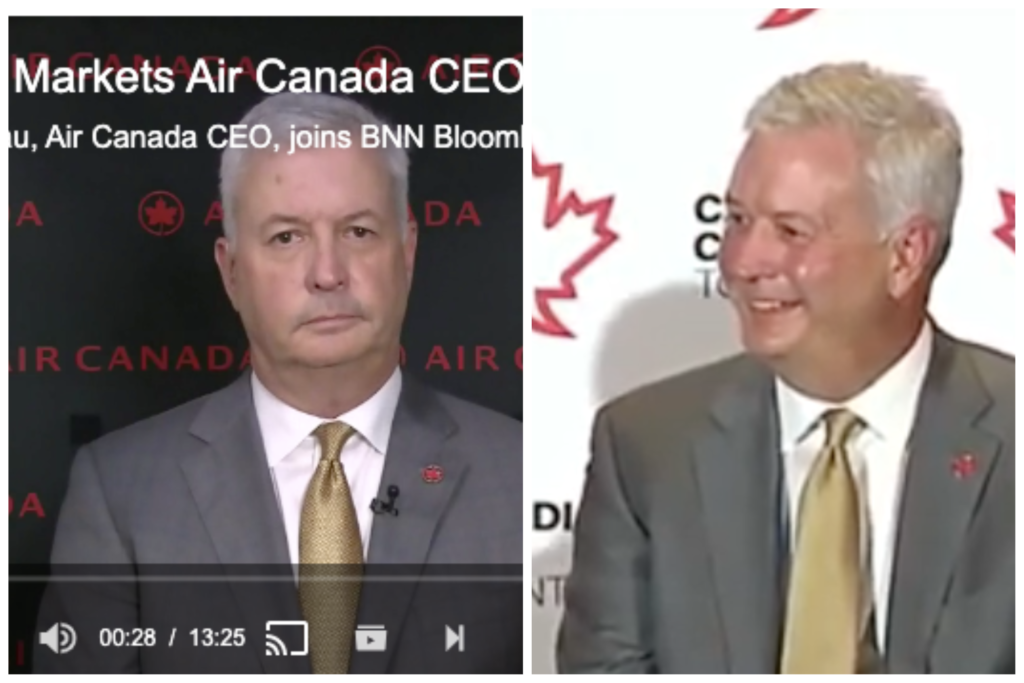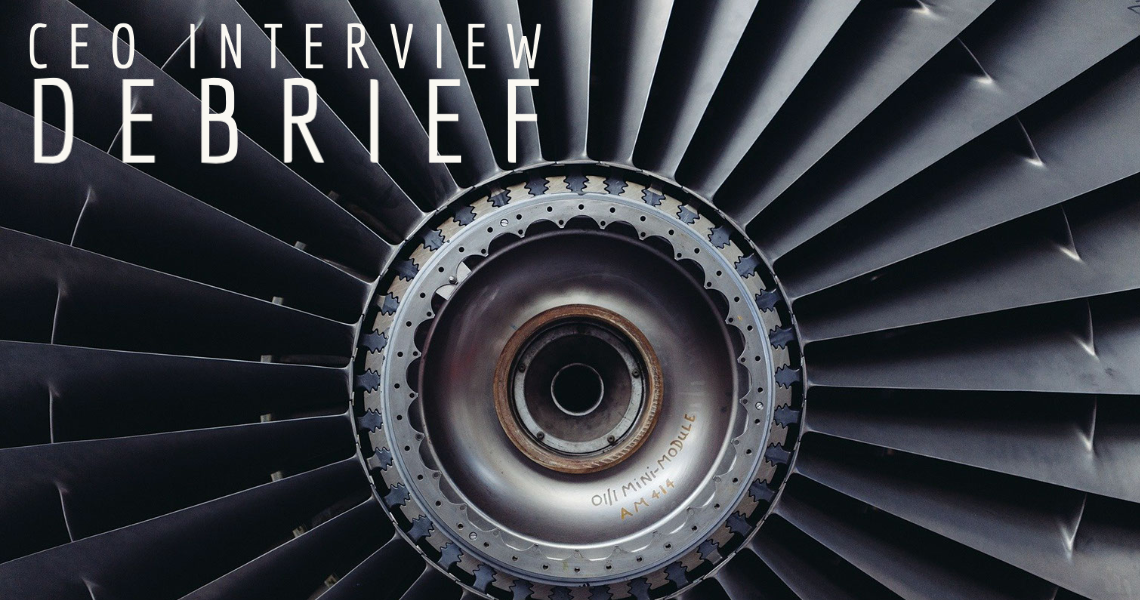Air Canada’s CEO Michael Rousseau took over the top job in February, in the midst of a global pandemic during which 27,000 employees were laid off. He soon had to manage through an entirely predictable uproar over executive compensation while negotiating financial support from the federal government. (Rousseau ultimately pledged to return his bonus compensation.) Fun, right?
Not the simplest of transitions from CFO to CEO, so you might imagine he was hungry for a bit of a reset, and a chance to re-introduce himself to the market. Moving from the CFO to CEO role requires a shift in how you show up – it’s a different job, with different reputational responsibilities. I provided some (unsolicited) advice on managing the transition from CFO to CEO last December, and now we have the chance to see how well he is showing up as CEO of a globally respected airline.
Rousseau’s speech at the Canadian Club earlier this month, combined with a spot at BNN on the same day was a bit of an unveiling of “Michael Rousseau, CEO.” It was an opportunity, particularly given where we are in the pandemic now, to show people what kind of a CEO he intends to be, share his vision for economic recovery, and to get out of the shadow of Calin Rovinescu, his lionized predecessor.
CEO as Chief Enthusiast
Both appearances were a little flat, marked by missed opportunities. The speech felt too much like an AGM and the interview like an analyst call. In both venues, he came off as…an accountant. Which he is, of course. He gave the air of a steady, competent hand who knows the business thoroughly, but he did not show bring the fire and charisma of a global champion leader. He did not share a vision, or even demonstrate his love for the business.
While I have lots to say about his speech as well (shocking to no one), let’s focus today on the BNN interview.
The Question Taker
Just as it was with Allied REIT CEO Michael Emory, whose BNN interview I analysed last week, Rousseau didn’t seem to have a plan for the interview. I can’t help but think that it was really an afterthought to the speech, and not actually prepared for. I imagine that the BNN producer probably saw that he was speaking at the Canadian Club, sent a note, and he probably just accepted.
Rousseau fell into the role of Question Taker from the very first question. Question Takers, as those who have been through one of my media training sessions will know, are those passively follow the host’s lead, with no attempt to introduce their own topics or to shape the conversation. While Allied REIT’s Emory at least came to the first question with a plan (as discussed last week), Rousseau let an introductory soft ball question from host Jon Erlichman float right past him.
Erlichman: “Let’s start with the story of the recovery. If you had to paint a picture for our audience, I know you’ve been fielding this question a lot recently, where would you say your carrier is right now?”
This is the kind of question that a CEO could take anywhere – by focusing on the key word ‘recovery’. Tell me about the future. Tell me your vision. Share your strategy. Instead…
Rousseau: “Right now, the number of customers going through our system are about 45%…”
This is where Rousseau demonstrated that he’s still in the mindset of a CFO, rather than a CEO.
Share Your Vision
Don’t get me wrong, data is good. But this was his opportunity to set the focus and tone of the interview. Part of the role of the CEO is to create enthusiasm for the business and share and build support for his strategy and vision. Imagine that opening answer being something like: “Well, people are starting to fly again – we’re at about 45% of pre-pandemic levels – but people are eager to reconnect with friends and family, and those types of travellers have been the first to return. We’re thrilled that with vaccination being so successful in our country that it’s incredibly safe for people to hold those weddings and anniversary parties and family reunions they’ve been waiting for. Oh and by the way, we’ve just announced a new route between Billy Bishop to Ottawa to make those visits even easier.”
That idea of being the connector of people (both for leisure and business) was a clear message in Rousseau’s speech earlier in the day, but it barely made an appearance on BNN, and he didn’t mention the new route at all. He took a literal approach to questions again and again.
When he was asked about employment, he had the data ready and followed with a point about the importance of Air Canada to job creation more broadly, noting that a recovery of Air Canada is good for everyone. But this was his first missed chance during the interview to deliver the same message he delivered at lunch: if governments help Air Canada succeed, we will help accelerate the overall recovery, and he had stronger data to back his point than what he used.
Look for Opportunities to Bridge
Over the course of the 13-minute interview Rousseau had many windows to repeat the key messages from his Canadian Club speech – his three asks for government to help airline recovery, and his shared call to action for both government and business – encourage people to come back to the office. Unless you were in the room or listened to the recording (very few do), you will have missed his key message. You need make your point again and again, across all platforms. If you are trying to get the government’s attention, you have not repeated your message enough until you are sick of the sound of your own voice.
In the BNN interview, the result is that viewers are left without a clear takeaway. The headline on the written summary illustrates how flat the interview was: “Air Canada CEO not planning to tap into public markets.” Focus fell on something that the CEO is not going to do, and was barely even part of the discussion. Why? Because he didn’t tell us what was important.
If you only read this post and didn’t watch the actual interview, you might be left thinking that the interview was a disaster. It absolutely was not. Rousseau’s answers were crisp. He knows his material and his business. He took moments to pause and decide what he was going to say. He was naturally very strong on the questions related to financing.
Interviewing is hard, no matter how well you know material. But it is also a buildable skill, formed through analysis and preparation.
Tips for a Better Next Time
- CEOs are responsible to share vision and strategy and to get people excited about the company. Tell me a story. With people in it. Rousseau spoke at length in his Canadian Club speech about the role of the airline as a connector, and said that we as a country are at risk of falling behind if we don’t get back to the office and face-to-face meetings. With a good anecdote he could have delivered this same point on BNN, and not sounded entirely self-serving.
- Know why you are there. What do you want the viewer or reader to know? If you listened to this interview only, you wouldn’t know that Rousseau had just delivered a speech in which he had four demands of government to aid recovery.
- Take or make opportunities to talk about things important to you, even if you’re not asked. it took Rousseau until he was prompted at the 10-minute mark to talk about his shipping business, and never mentioned the new Toronto Island–Ottawa route. Pick one important aspect you are excited about and want everyone to know and get it out there as early as possible.
- TV is a visual medium. Rousseau’s face is not very expressive, but he can deliver a great smile, as he showed at the Canadian Club (but only when the Leafs vs Habs discussion arose during Q&A.) While you don’t want to grin falsely on TV, you do want to avoid looking like you’re a hostage. (The lighting, the branded black backdrop and the cool-toned gray suit all contributed to the problem.)
- It is really hard when you can’t actually see your interviewer, as I think was the case here. If your eyes are focused a little below or flick to the side, as was the case with Rousseau, the camera notices. Stare straight into the camera, pretend it’s your interviewer’s face.
- Many of us have a tendency to nod as we’re being asked a question, particularly if it comes with a preamble, but if you watch Rousseau was nodding almost throughout the interview, no matter the question. Nodding absent-mindedly like this can give the impression to you agree with the premise of the question, rather than yes, I understand the question, which is what the action usually means.

Rousseau’s demeanor throughout the BNN interview on the left, contrasts with a moment of brightness at the Canadian Club.


